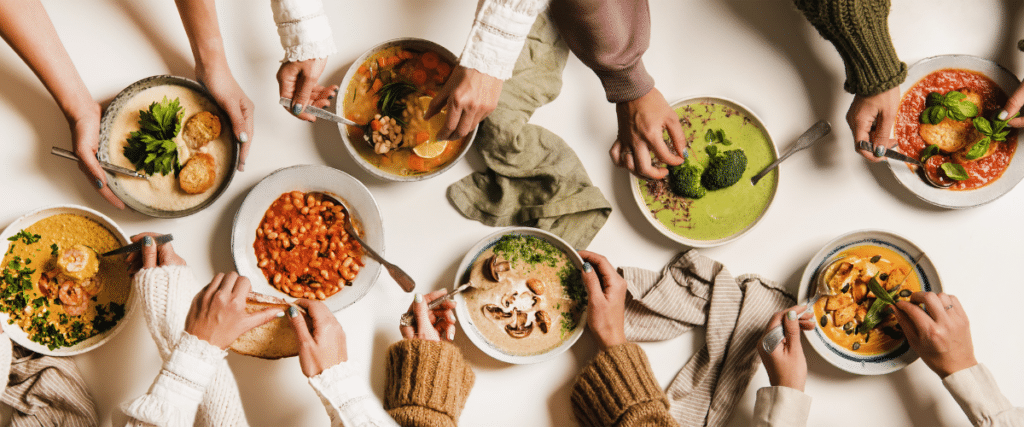The F&B sector bounces back post-pandemic, fast-tracking innovation as it adjusts to a new normal. Hive Life breaks down the top F&B industry trends in APAC accelerating green initiatives and sustainability in the food and drinks sector.
Without any doubt, the prolonged effects of the ongoing pandemic led to a dramatic downturn for the Food and Beverages (F&B) industry, being one of the worst-hit markets in the Asia Pacific region. As the world came to a halt, local food supply chains faced severe disruption, and in 2020 alone, the organised food service market in Asia dropped significantly, from 25% to 30%.
Drastic Covid-19 prevention measures left a mass of restaurants at a standstill and at risk of closure. Hong Kong was one of the Asian cities with the toughest Covid restrictions, and over 1,200 restaurants temporarily suspended their operations to cut costs while over 300 faced permanent closure during the peak of the pandemic.

This being just the tip of the iceberg, rising global concern for food unsustainability within the F&B industry is mounting pressure on businesses in the field to actively take initiatives to curb wastage and drive sustainable approaches in their day-to-day operations. Throughout the pandemic, consumers’ preferences and behaviour have been subjected to drastic reform, and as many were forced to isolate at home, cooking and delivery services, among other key trends, have become the new normal.
The food industry will continue to fast-track innovation and modernisation, revitalising the space by bringing new concepts from sustainability in food to nutritious and smart kitchen practices, to creating open and transparent supply chains, alongside delivering essential FoodTech solutions.
Read on to learn about the transformative industry trends affecting the F&B scene, and ways to incorporate green initiatives and sustainability in the food and drinks sector.

1. Healthier, Safer, and Sustainable Food Options
During the uncertain times brought on by the pandemic, health and wellness trends caught momentum and soon became a growing priority for the greater population. Consumers have since been increasingly aware of their product selection and consumption, taking into account health, safety, and sustainability aspects in the sourcing, production, and environmental impact of their food. By 2030, modern-day consumers in Asia will account for up to US$2.4 trillion in incremental food spending, with an increased demand for healthier, safer, and more sustainable food alternatives.
Gen Zs and young millennials, as key consumers, have glorified sustainable and mindful eating habits, playing a pivotal role in transforming the F&B space. Their shifting attitude towards sustainability in food and drinks primarily consists of reducing food wastage, opting for less packaging in goods, and buying locally sourced and produced food.
For F&B businesses to stay relevant and sustain their businesses, they must innovate beyond their branding. Restaurants can start by taking simple steps in the right direction, including rethinking their menus, incorporating fresh locally sourced and healthier ingredients, and serving diverse dietary needs, while ensuring food safety and traceability throughout their networks.

2. Supply Chain Transparency
F&B brands cannot attain true sustainability without practising transparency in their food supply chains, production, and operations. This goes beyond building a transparent network solely between suppliers; a company must maintain the same visibility and authenticity within its own processes, organisation, and its customers.
Consumer behaviour towards transparency in brands has shifted drastically, with up to 94% of consumers choosing to remain loyal to brands offering honest and transparent operations, while 39% would make the necessary shift over to corporations who are more vocal and forthcoming about their operations. Traceability and accountability in the supply chain are deemed essential practices for F&B companies to consolidate their transparency measures.
To reassure their consumers, but also practise sustainability, getting certified equips an F&B business with credibility. Some of the most important certifications for the F&B sector include acquiring the Eco-Friendly Certified, for buyers to easily identify green and sustainable products. In addition, the Fair Trade Certification and Rainforest Alliance help businesses meet with sustainability and supply chain standards, as well as the BPI certification, which provides a credible accreditation for its biodegradable packaging and products.

Read more: 7 Globally Recognised ESG Certifications to Build a Socially Responsible Business
3. Plant-Based Eating
As a growing number of individuals make the healthy shift to a plant-based diet, it is necessary for restaurants to be able to cater to their specific needs. If a menu evaluation is not feasible, simply providing meat alternatives is a good place to start. In the wake of Covid-19, plant-based products were presented with promising market growth in Asia, and their valuation is anticipated to increase by 25% to US$1.7 billion by 2055.
While Singapore currently leads innovation in FoodTech for the development of alternative proteins nationwide and beyond, certain plant-based protein substitutes have always been a component of traditional local cuisines such as soy, mock meat, tofu, legumes, and more.

Read more: Alternative Protein: 7 Game-Changing FoodTech Startups to Know
4. Reducing Food Waste
While Asian cities are celebrated for their robust mix of culinary cultures and delightful cuisines, one cannot overlook these nations’ deep entanglement with the food crisis. Asia contributes to over 53% of the global food waste, with around 25% of this waste generated in Southeast Asian nations, and the remaining 28% coming from industrialised Asia, such as Japan, China, and South Korea.
APAC has witnessed the rise of eco-conscious initiatives, and brands are actively making an effort to develop their restaurants into more sustainable concepts, by donating leftovers to charities, ensuring proper food storage and monitoring systems, composting organic waste, and other methods.
Moreover, emerging FoodTech startups and food rescue platforms have seen great adoption rates, offering a new sustainable food solution. F&B labels can partner with such organisations to rescue and repurpose food that would otherwise end up in landfills.
CHOMP is one such food rescue app dedicated to fighting waste in Hong Kong. It helps consumers access various restaurants and cafes across the city to shop for food with an end-of-day expiration at a discounted price. Another similar concept, LET, is an excess inventory marketplace based in Japan, that allows F&B brands and customers to purchase and sell excess products with special discounts.

5. Cloud Kitchens
A seamless “virtual kitchen” without the hassle of managing a dining space, the cloud kitchen concept underwent an unprecedented uptake during the pandemic, as more restaurants leapt towards food delivery services, in an attempt to continue serving their customers whilst surviving the harsh competitive F&B environment. The cloud kitchen market in the Asia Pacific region is expected to be one of the largest markets by 2027, with a growth rate of 14.4% annually.
As businesses shift to a delivery-only model in an attempt to cut operation costs, the market is proving to be viable as the process of locating and securing kitchen spaces is simple and convenient. A large number of commercial restaurants have considered offering shared kitchen counters for smaller F&B brands. The growing momentum has caught the attention of numerous restaurateurs, and many new ghost restaurants have been emerging in APAC as a result.

JustKitchen is Taiwan’s first cloud kitchen concept that accommodates its in-house food labels, and partners with other small companies, helping F&B businesses cut extra overhead costs, while prioritising customer satisfaction.
Across the region, Freshlane from Hong Kong provides innovative and optimised kitchen spaces for local F&B labels to rent, and another large-scale operator, GrabKitchen, has locations across SEA, including Singapore, Thailand, Malaysia, and more.

Related Articles
How Artificial Intelligence is Driving the Future of Food
Your Guide to AgriTech, the Next Big APAC Industry
Phenix by OnTheList: The Food Rescue App Driving Sustainability in Hong Kong’s F&B Scene





